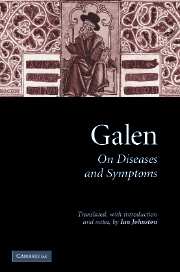Book contents
- Frontmatter
- Contents
- List of tables
- Acknowledgements
- List of abbreviations
- PART I INTRODUCTION
- PART II TRANSLATION
- II.0 Introduction
- II.1 On the Differentiae of Diseases
- II.2 On the Causes of Diseases
- II.3 On the Differentiae of Symptoms
- II.4 On the Causes of Symptoms I
- II.5 On the Causes of Symptoms II
- II.6 On the Causes of Symptoms III
- PART III CONCLUSION
- Bibliography
- Index
II.6 - On the Causes of Symptoms III
Published online by Cambridge University Press: 22 September 2009
- Frontmatter
- Contents
- List of tables
- Acknowledgements
- List of abbreviations
- PART I INTRODUCTION
- PART II TRANSLATION
- II.0 Introduction
- II.1 On the Differentiae of Diseases
- II.2 On the Causes of Diseases
- II.3 On the Differentiae of Symptoms
- II.4 On the Causes of Symptoms I
- II.5 On the Causes of Symptoms II
- II.6 On the Causes of Symptoms III
- PART III CONCLUSION
- Bibliography
- Index
Summary
SYNOPSIS
I.1 Preliminary remarks on the symptoms of the physical functions and their general correspondence in type to those of the psychical, i.e. loss, reduction, abnormality. This is briefly exemplified by reference to the stomach.
I.2 Changes of digestion relate to the alterative capacity itself, or to external factors. Damage to the capacity may be due to a dyscrasia, or to an organic disease affecting it.
I.3 ‘External’ factors include changes in the quality or quantity of what is ingested, changes in the times or sequences of ingestion, or to lack of sleep.
I.4 Brief reference to the three components of digestion as a whole, followed by a further statement about the threefold division of symptoms into loss, reduction and abnormality of function, bradypepsia being the second and ‘corruptions’ the third.
I.5 Consideration of the post-gastric components of digestion as seen by Galen – that is, in the veins and in the ‘whole system (hexis)’. Privation of function results in atrophy, reduced function in emaciation, and abnormal function in leuke and elephantiasis. Causative factors come down to weakness of the capacity, problems of intake, and external factors including way of life.
I.6 A statement that the doctor must not only know what has happened but why it has happened, specifically here in relation to disturbances of digestion.
I.7 Defective function of the capacity is attributable to dyscrasia. The resulting ‘corruptions’ of food have characteristics specific to the particular food.
II.1 The same threefold division applies to the ‘contracting around’ due to the retentive capacity – the results are ‘inflations’ and ‘splashings’.[…]
- Type
- Chapter
- Information
- Galen: On Diseases and Symptoms , pp. 265 - 302Publisher: Cambridge University PressPrint publication year: 2006



